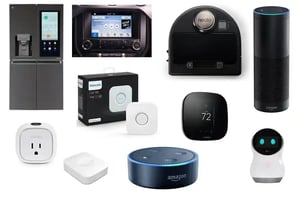What can sales teams learn from people's use of Smart Home devices?
Matter - The new industry standard that is changing everything.
We are here to tell you that there is big news in the connected products space. Previously making and using connected products were much more complex and/or limited in features. Each customer we work with needs to navigate the major tech companies' different ecosystems, protocols and standards. Matter removes these headaches and makes it much cheaper to produce smart products with incredible features. Matter itself can be a little confusing at first, so we’ve pulled together our customers' and prospective clients' questions to help you better understand why Matter is a big deal.
What is Matter?
Matter is a huge step in allowing users to connect all of their products together. According to the Connected Standards Alliance, Matter is: “One protocol to connect compatible devices and systems with one another. Smart home devices should be secure, reliable, and seamless to use. And with Matter, they are.” Up until now, your smart devices, like Amazon Alexa and Google Home, could only connect to the corresponding companies apps and voice assistants. For example, a set of lights that were built with an Amazon Alexa chip (Alexa Connect Kit or ACK), would only work using the Alexa app on your phone, or using an Alexa device. In the future, Matter will make it so a user can connect their IoT products (Lights, Brewers, etc.) to their favorite assistant.
What kind of Home tech will it be used in?
Matter will allow all kinds of devices to become “smart” and connect to any of your favorite voice assistants. A lot of home appliances can be made smart. Any lights installed in or out of the home, can be connected and controlled via voice or other triggers. For example, someone could have their lights in the driveway turn on when they get home at night. Connected products could also be your refrigerator alerting you that it’s been left open, your brewer making you a cup of coffee when you're busy getting ready in the morning, or controlling your home heat/cooling system.
Is it software, a programming language, or a network protocol?
Matter has been dubbed a smart home protocol. There have been many companies in the space, but all have been building out their own environments, chips and software to control and communicate with these devices. Now, according to The Verge, “Amazon, Apple, Google, Samsung, the Zigbee Alliance, and dozens of other companies [will] work together on an open standard.” That standard has now been dubbed “Matter”.
How will it affect current home tech?
Now companies can provide cheaper, more secure and more feature rich products. Companies have access to cheaper chips to make their smart products with. Users will have an overall better experience and an easier time finding affordable smart home products. Overall this means growth in the future of smart home products.
Does the standardization of home tech protocol mean products like google home and Alexa will be able to work together or will it only apply to things like smart lights and smart locks?
Matter does not make it so you can use, say, Alexa on a Google Home speaker. It will however mean that a smart device can be connected to both. So a user would still have a Google account and an Alexa account, but both can control any device they own.
Will home tech companies use matter to force customers to buy new products or will a firmware update be available for existing products?
The current products will continue working as they are now. There isn’t a way to upgrade the product to the new Matter standard. That doesn’t, however, force a user to get a new product. Just the next time a smart home user buys a device, it will have a higher standard and more features available.
Are there any security concerns?
There are always security concerns when it comes to connected devices and computing in general. This new protocol, however, greatly increases the security in these devices. From how often the device needs to connect to the cloud to upgrading the Wi-Fi security protocols to Wi-Fi 6. Everything Matter is doing will increase the security of these devices.
Can it be used by your phone while away?
Yes, a user can connect to their devices while away. Now when you leave the house and forget if the house is locked and the heat/cooling is turned off, you can check on your phone and even lock or turn off devices remotely.
Will manufacturers be able to limit its capabilities ?
Manufacturers will decide how much of the features to include, they aren’t intentionally limiting the capabilities. For example, if a manufacturer is making a light, they can make a white light, lights with colors or both. The light with all the capabilities will cost more, since the manufacturer needed to put more expensive parts into the light. The manufacturer wont limit the users ability to manipulate the light though. In fact, it unlocks more features. Buttons on devices cost more money in parts, so a manufacturer may limit the features, depending on space on the device and the cost of the additional parts. Now through voice and smartphones, the features can get unlocked without the additional cost during manufacturing.
Will Matter be used by smart home hubs?
Yes, every major platform has upgraded their hubs and smart home speakers.
Does Matter eliminate the need for WFfi?
Matter makes it so that if the user does lose WiFi, their devices remain communicating. Wi-Fi however does remain an important piece of the smart home ecosystem.


